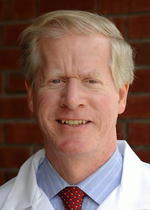Putting a Spotlight on Firefighter Cancer Awareness Month
Michael Hamrock, MD, a former firefighter, discusses the health risks of this occupation

In his dedicated service to the Boston Fire Department, first as a firefighter, and later as the department’s Medical Director, Dr. Michael Hamrock has lost too many good friends and colleagues from occupationally related cancer. It is from these experiences, along with being the primary care physician for many Boston area firefighters at St. Elizabeth’s Medical Center, that he has developed a unique perspective on the many health risks associated with firefighting and the reason for becoming a passionate and tireless advocate for the prevention and early detection of cancer in all firefighters.
From their extensive studies on the development of cancer in firefighters, the International Agency for Research on Cancer (IARC) of the World Health Organization (WHO) in July of 2023 declared that firefighting is a cancer-causing occupation and is now considered a Group 1 carcinogen. January is Firefighter Cancer Awareness Month, and Dr. Hamrock encourages everyone to take the time to thank our local firefighters for their selfless service and gain a better understanding of their unique risks for occupational cancer.
“It is the inhalation, ingestion, and direct absorption of the toxins on the fire ground and in the firehouse that cause cancer in firefighters,” said Dr. Hamrock. “These carcinogenic exposures occur from the combustion of flame retardants, smoldering plastics and synthetics, diesel exhaust and particles, and the PFAS (polyfluoroalkyl substances) chemicals that are contained in all the layers of the bunker gear and in firefighting foam.”
To better appreciate these exposure-related cancer risks, stand next to a firefighter three days out from fighting a fire. You can still smell traces of smoke emanating from their bodies. Unfortunately, many toxins remain and travel in their bloodstreams where they can harm organs, causing abnormal cell growth, mutations, and cancer formation years later.
Cancers of the lung, gastrointestinal and genitourinary systems, blood, and skin have become too common in firefighters because of their unique exposures. Additional concerns for female firefighters include elevated rates of thyroid, breast, and cervical cancers.
“It’s imperative that we do more to help prevent and find these high-risk cancers early and in the most treatable and curable stages. This begins with firefighters undergoing annual comprehensive physicals with early detection cancer screenings and practicing optimal self-care on the fire ground, at the firehouse, and in their own home,” he said. “This firefighter physical should include earlier age mammograms, colonoscopies, and prostate specific antigen (PSA) blood tests along with a thorough dermatological exam.”
Dr. Hamrock is encouraged to see that Massachusetts and New Hampshire are among a few of the states leading the way in becoming more proactive with firefighter health and wellness issues. They are supporting the implementation and coverage of early detection screenings that target these high-risk cancers to include CT chest scans, ultrasounds of the thyroid, abdomen and genitourinary systems, and multi-cancer early detection blood tests.
“These initiatives will certainly help find these cancers early and lessen the need for invasive treatments and lengthy time off while saving the lives of many firefighters. Additionally, these screenings will save taxpayer dollars from significant reductions in injury leave, overtime pay from minimal staffing requirements, and disability claims,” says Dr. Hamrock. “Studies now show that early-stage cancers have a four times better survival rate along with treatment costs that are less than one-half of late-stage cancers.”
Dr. Hamrock is proud to be a part of the team at the First Responder Early Detection Screening Program at St. Elizabeth’s Medical Center and Carney Hospital and has seen the results of cancer awareness and prevention measures for firefighters.
“Numerous firefighters underwent lifesaving cardiac procedures and cancer interventions because of the findings of these workups. All felt these scans were excellent motivating factors for better self-care and lifestyle changes,” he said. “While we may never be able to eliminate all these harmful exposure risks to firefighters, we can enthusiastically support their quests to obtain PFAS free bunker gear and comprehensive early detection screenings. This will serve to prevent and help find their cancers in earlier and more treatable stages and allow them to return to work healthy and hopefully enjoy many long years of retirement with their loved ones.”
About St. Elizabeth's Medical Center
St. Elizabeth's Medical Center, a Boston University Teaching Hospital, offers patients access to some of Boston's most respected physicians and advanced treatments for a full range of medical specialties, including family medicine, cardiovascular care, women and infants' health, cancer care, neurology care, and orthopedics. The 306-bed tertiary care facility is part of Steward Health Care. For more information, visit www.semc.org.
About Steward Health Care
Over a decade ago, Steward Health Care System emerged as a different kind of health care company designed to usher in a new era of wellness. One that provides our patients better, more proactive care at a sustainable cost, our providers unrivaled coordination of care, and our communities greater prosperity and stability.
As the country’s largest physician-led, minority-owned, integrated health care system, our doctors can be certain that we share their interests and those of their patients. Together we are on a mission to revolutionize the way health care is delivered - creating healthier lives, thriving communities and a better world.
Steward is among the nation’s largest and most successful accountable care organizations (ACO), with more than 5,600 providers and 30,000 health care professionals who care for 12.3 million patients a year through a closely integrated network of hospitals, multispecialty medical groups, urgent care centers, skilled nursing facilities and behavioral health centers.
Based in Dallas, Steward currently operates 33 hospitals across Arizona, Arkansas, Florida, Louisiana, Massachusetts, Ohio, Pennsylvania, and Texas.
For more information, visit www.steward.org.
